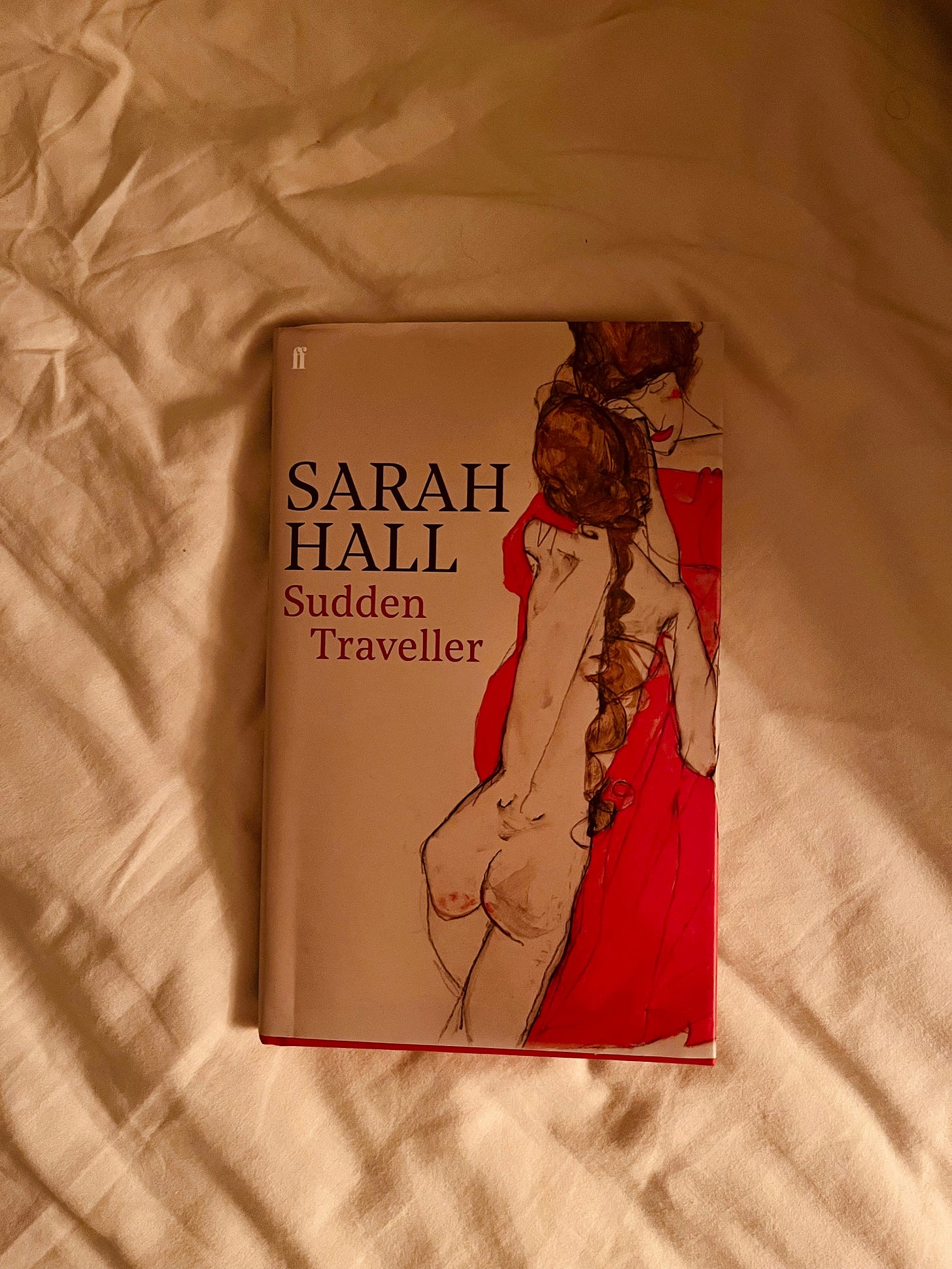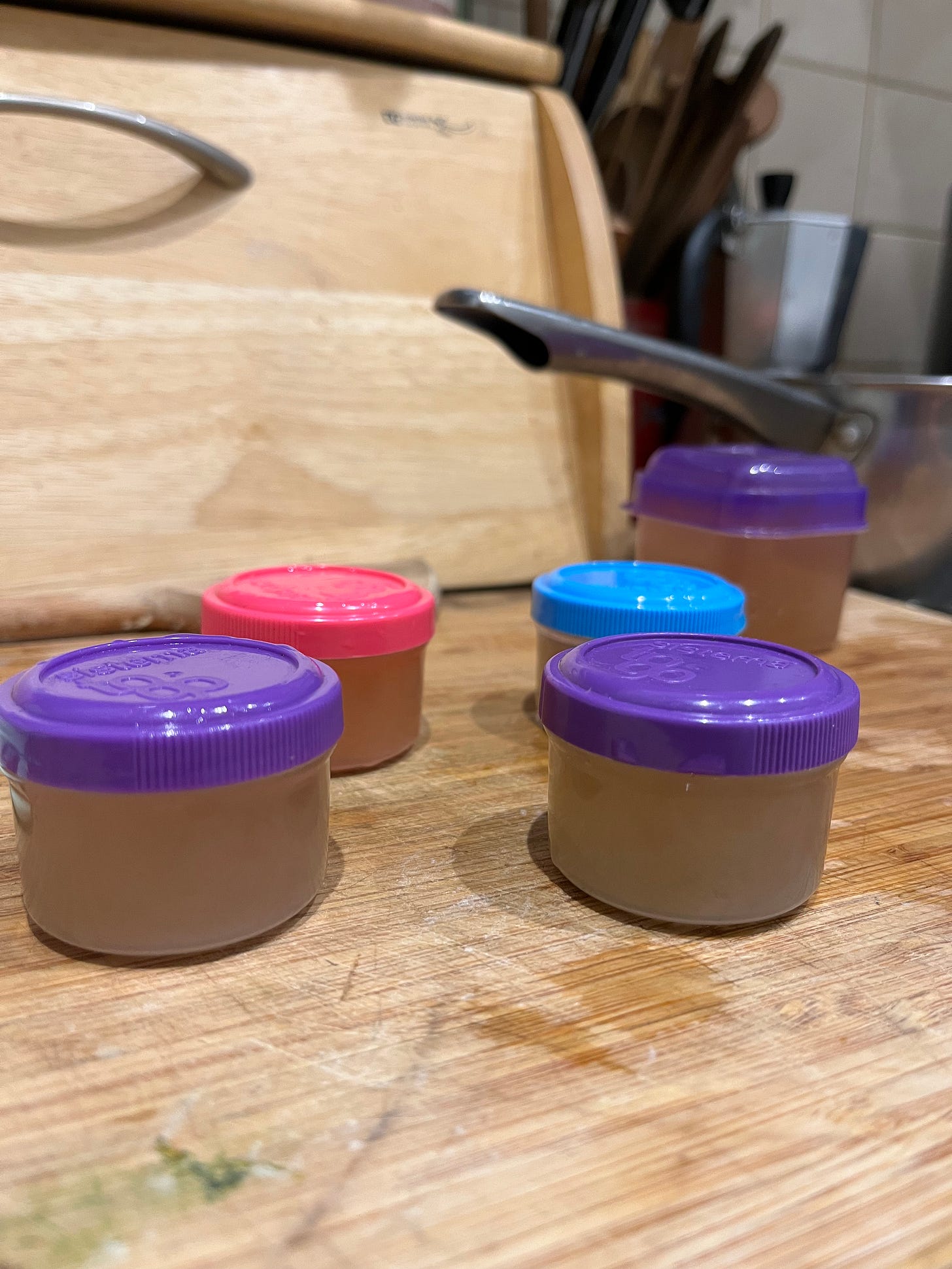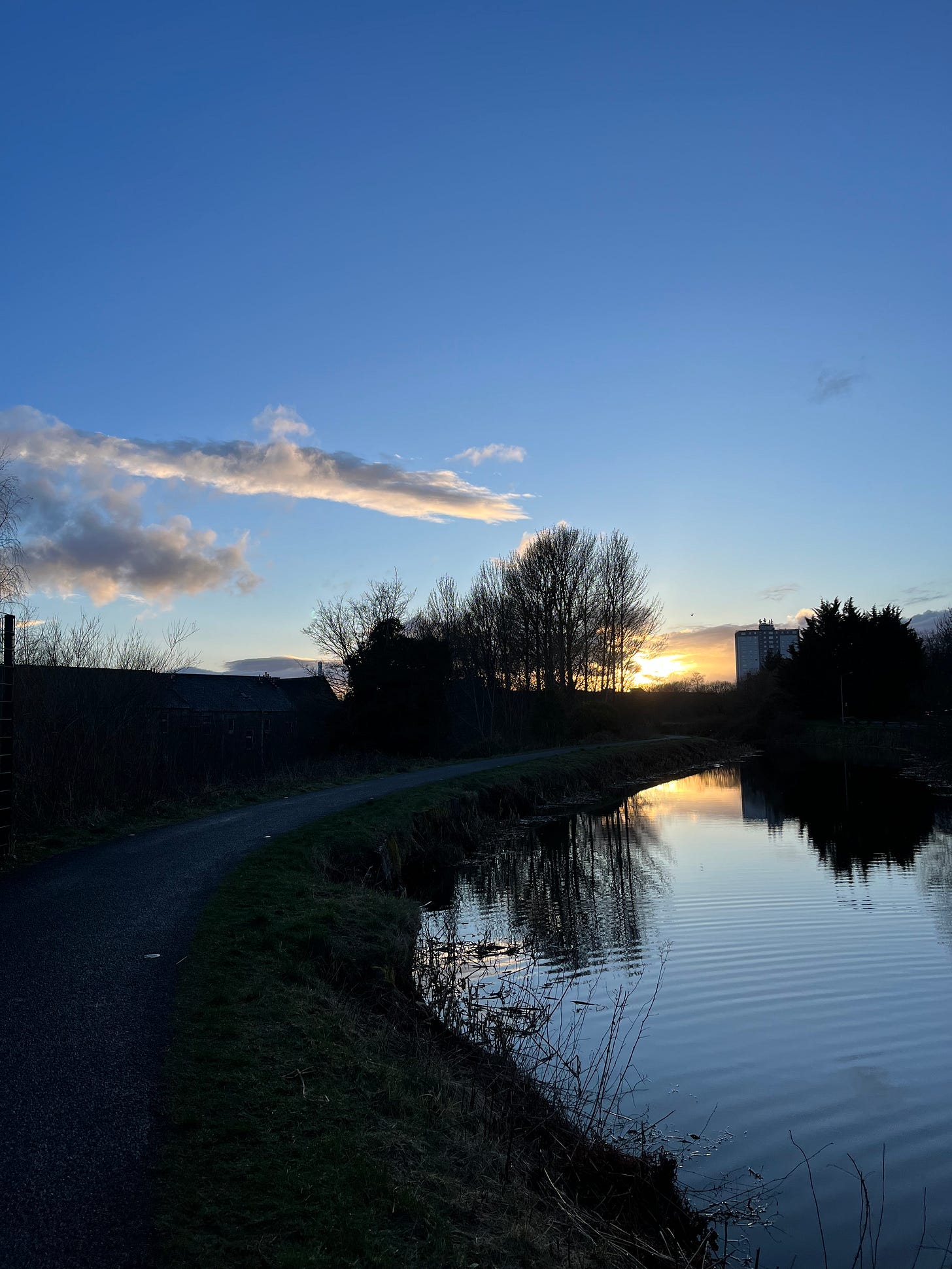March Peels
an invitation to a supper club, handwritten dedications and books; focaccia, broth and biscuits; spring
Hello – and, if you’re new to The Onion Papers, welcome! I’m Margaux, and very happy to find you here. Peels are the round-up feature at TOP, which comes out on the first day of each month. I hope you’ll enjoy it,
Mx
In March, the trees in the park had blossomed already when I received a snow notification from the weather office. ‘But the true nature of the human heart is as whimsical as spring weather. All signals may aim towards a fall of rain when suddenly the skies will clear,’ famously said Maya Angelou.
Eating the Novel: a Supperclub
I’m excited to announce that I’ve partnered with chef extraordinaire Numra of Empress Market for the launch of my second novel, Breaststrokes, and to plot a special night about strangers coming together and the communal celebration of a meal.
The story behind the event — in Breaststrokes, Cloe, Gertrude and the Jenkins-Bell sisters, Mathilde and Sarah, are strangers who share a city. Until their paths cross at the pub on a Sunday evening. Food is an essential social connector and conductor, in the novel and in life, which sparked some conversations about Sunday roasts, culinary traditions and food pairings and the portrayal of food in novels, and Numra plotted a menu inspired by this.
The event will take place at the wonderful South London Louie. Tickets include a complimentary drink on arrival. Aside from delicious food, there will be readings and conversations, including a discussion about food in fiction between myself and Bre Graham, author of Table for Two.
The menu is inspired by the characters in Breaststrokes and, most importantly, the result of Numra’s touch. Numra is a London based chef and host of Empress Market supperclubs. Her dining events explore the connection between culture, identity, community and food. Storytelling is at the heart of Numra’s menus. I met Numra by attending one of her supperclubs and she was one of our guests with my co-host, Irene, for the SPK podcast; I’m very luck and excited to have Numra as my kitchen-partner for this event.
We’d love to see you there – let’s spice up book launches?!
(I realise this event is London-based but this newsletter isn’t. I hope to be able to share more events news in due course. For now, if you’d like, the book is available to pre-order here.)
Bread update:
I’ve grown fond of baking loaves with a combo of six-seeds flour and white spelt (80/20 share). If you’re thinking about flour too, might I recommend (again) Farmerama’s Cereal podcast series? At the cooking end of the gig, five extra minutes in the oven, taking the baking time to 50 minutes total at 220C, has fixed the crust. I bake in a cast iron casserole, so that’s 30 minutes with the lid on and 20 minutes without it.
I foresaw it last month, and in March I made my first rosemary and sea salt focaccia. This isn’t the perfect focaccia recipe as it shadowed an anxious day more than the demands of a fermenting dough. It’s an easing and oily process though, with a good ending, so I’d still recommend. You’ll need: 400g of flour (type 00), 2 teaspoons of fine salt, 7g of dried yeast, 300g of warm water, 80ml of olive oil, a handful of rosemary and sea salt.
In a large bowl, pour in the flour, the salt and the dried yeast. Mixing continuously with a wooden spoon, add 40ml of the olive oil, then start adding the warm water until you’ll have a slightly wet but firm dough. Mixing with your hands will make this step easier; the dough shouldn’t be sticky (you can adjust water quantities as you go). Wet your hands and transfer the dough on a working surface. Knead for 10-15 minutes, shape it in a ball. Return the dough in the bowl, cover with a damp towel, and let it rest in a warm place for 2 hours. It should double in size.
Prepare a baking sheet with a drizzle of olive oil. Return the dough to the working surface and stretch it with a rolling pin, so it’ll fit the size and shape of the prepared baking sheet. Transfer the dough on the baking sheet (with a tray underneath it), cover with the damp towel, and let it prove for one hour.
Preheat the oven to 220C fan. In the meantime, pierce small holes over the dough with your finger. Pour 20ml of the remaining olive oil over it. Scatter the rock sea salt and rosemary evenly. Sprinkle with a few drops of water. Bake for 15-18 minutes.
Remove from the oven and drizzle the remaining 20ml of olive oil. Cut into rectangles and make delicious sandwiches?
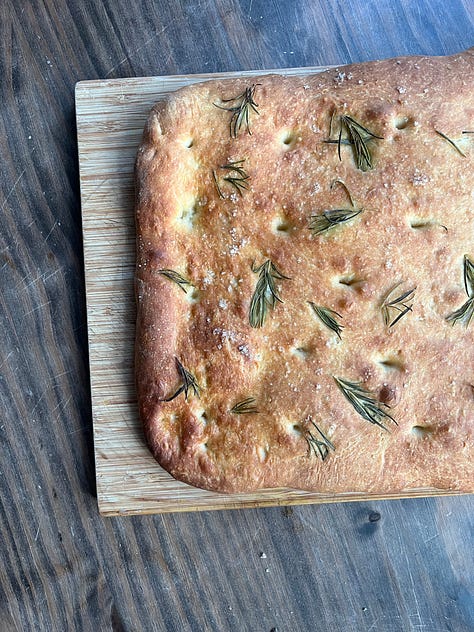
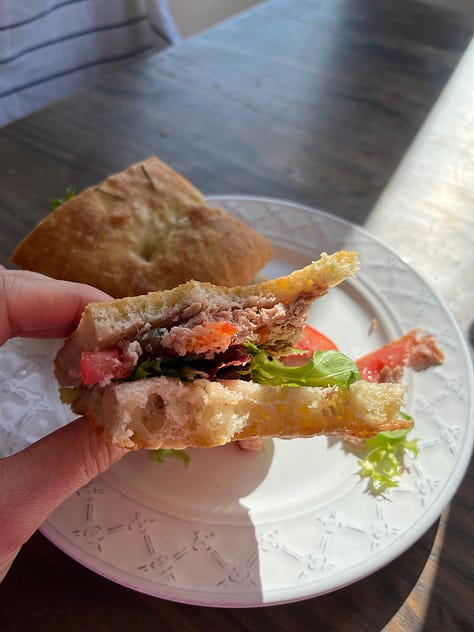
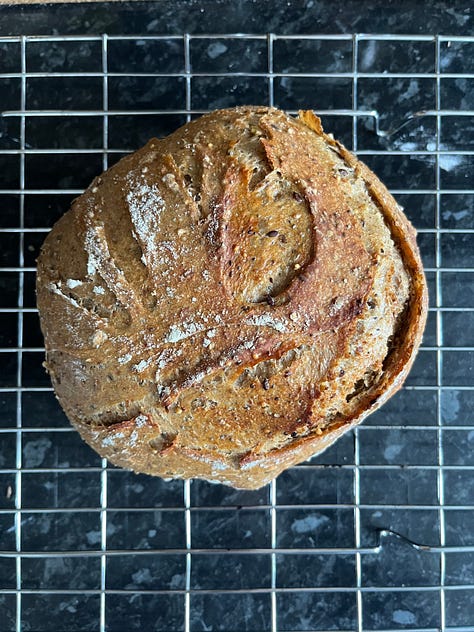
Listenning, reading:
I was influenced by the Women’s Prize for fiction’s longlist when I finally picked Brotherless Night by V. V. Ganeshananthan from my shelf, and I didn’t regret. It’s an epic exploration of civil war, a coming-of-age and compassionate novel. The book also held a good surprise as the friend who gifted it to me had left a little note for me to find inside. The curves of her words made me happy and here I’m writing a plea to you to please dedicate books before giving them away—think about it as wordily earmarks that will make someone smile further down the line.
One of my favourites (including a delicious recipe), from a second-hand cookbook I bought last year:
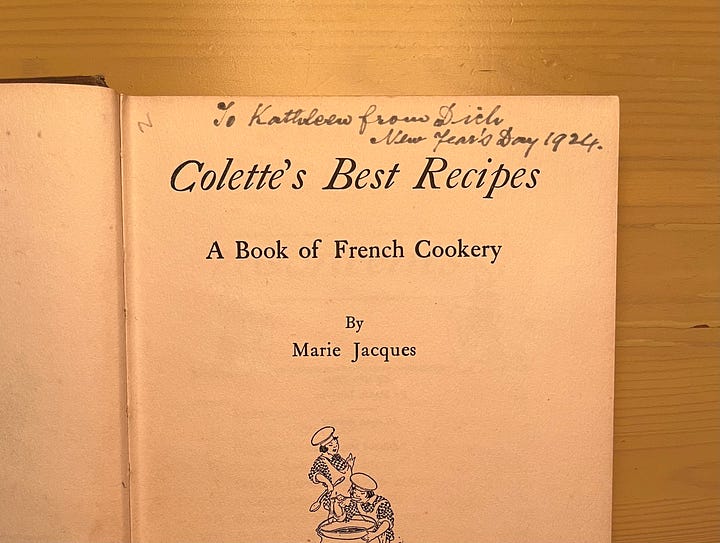
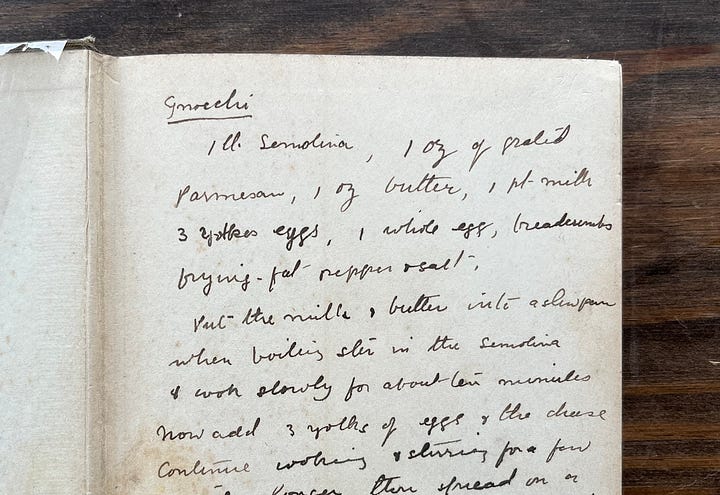
Slowly, one story after the other, Sarah Hall’s Sudden Traveller collection has consumed me. The stories are devastatingly quiet, and Hall’s language has moved me deeply. A great teaching experience about contained form.
Speaking of form, on the more expansive side of it, comes Brandon Taylor about Zola’s naturalism and Les Rougon-Macquart for the London Review of Books. Consider this entry biased by having drawn many family trees of the Rougon-Macquart on my French exercise books when I was in school. (I’m a fan of Z.)
‘For me, these four books – The Assommoir, Germinal, Earth and La Débâcle – represent the essence of Zola’s moral argument against war, convention, the petty gods of the bourgeoisie and the complacency of material comfort. For Zola, the greatest moral act is to bear witness. Sometimes when I read novels set in the past, a contemporary smugness sets in. But when the past comes uncomfortably close to the events you’re living through – another example would be my reading of The Fortune of the Rougons, about Napoleon III’s coup d’état, months after the assault on the Capitol – you realise how new so many of our institutions and customs are, and how fragile.
But what moved me most in these novels was not the extra-literary moral dimension necessitated by Zola’s naturalism. It was his literary skill, sometimes most apparent in the novels’ quieter moments.’
My audiobook journey continues. I loved The Mermaid of Black Conch by Monique Roffey, a haunting and sensuous novel set on an imaginary Caribbean island. If you’re unsure about listening to novels, then this one is for you: the production was fantastic and might have put a spell on me.
And please give all the prizes to Noreen Masud’s A Flat Place. It’s a courageous, gorgeous and raw memoir that has made me rethink how trauma perdures and consider the haunting repercussions of traumatic events from a different angle. A Flat Place is part-nature writing, a love story to flatlands; part-memoir about the author’s childhood and her experience living with complex post-traumatic stress disorder; part-pilgrimage through folklores and history.
In the kitchen:
It’s a mess! But I made plenty of broth with all the veggie scraps I had accumulated, poured it in small containers, and stocked it in the freezer. This means lots of soups (leeks, mushrooms and cannellini beans) and couscous for dinner.
& some easy, nutty biscuits for you:
40g almonds, chopped
60g flaked almonds, chopped
100g blanched hazelnuts, chopped
60g ground almonds
40g flour (00)
40ml oat cream
40g butter
1 tbsp whisky or liqueur (optional)
100g brown sugar
Zest of one orange
100g dark chocolate (80%), melted
Crush the nuts in a mortar and pestle, or chop them as finely as possible, then set aside. In a saucepan, gently melt the butter and dissolve the sugar together. Turn off the heat and stir in all the ingredients (except for the dark chocolate). Mix well with a wooden spoon, until fully combined. Preheat the oven to 180C fan and grease a baking tray and sheet. Using a dessert spoon, place dollops of dough over the tray. Bake for 20 minutes. In the meantime, melt the chocolate. Deep one half of each one of the baked biscuits inside the chocolate and place the biscuits on a cooling rack. They preserve well inside a sealed boxed.
From The Onion Papers:
French-born, naturalised American artist Louise Bourgeois said: ‘Expose a contradiction, that is all you need.’ – and a recipe for madeleines.
*
Rocks cracked open for the bones of this land on which I was walking for the first time. Birds hovered before they took a plunge between two waves; at this end of the world, my intuitions were unleashed and corrupted, sensual and desperate, unreliable, they tasted delicious.
*
Race is not always to the swift: mushrooms e borlotti polpette ragù, served with mafalde pasta, to remember.
Looking ahead (Glasgow, GMT):
In April, watch out for the trees. ‘Oak before ash, we'll just have a splash; ash before oak, we're in for a soak,’ as the saying goes, predicting a drier summer if oak comes into leaf first. The full moon will fall on the eighth day of April, and asparagus season, like everything else, seems to be tracking for an early arrival. Please send me your favourite asparagus recipes?
Margaux
Thank you for reading. The Onion Papers is a reader-supported publication. If you enjoy my work, you can support what I do by upgrading to a paid subscription. You’ll get access to the full archive and weekly entries. It costs £4 per month, or £40 a year, and you can unsubscribe at any time. No pressure: I’m happy you’re here either way.







